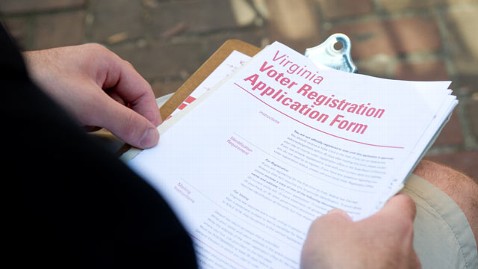24M Voter Registrations Invalid, Pew Reports

Image credit: Saul Loeb/AFP/Getty Images
With nearly 24 million active voter registrations in the U.S. either invalid or inaccurate, eligible voters are falling through the cracks, according to new research from the Pew Center on the States.
"Eligible voters [are] not getting the information they need," said David Becker, the director of Election Initiatives at the Pew Center. "It's important that [voter] lists are accurate so that eligible voters can participate. It's the gateway to our democracy."
For its report, called "Inaccurate, Costly and Inefficient," Pew worked with research institute RTI International and Catalist LLC to examine voter registration lists. A lead researcher told ABC News that the numbers in the report were estimates.
While Catalist maintains a national database of U.S. voter lists, it does work for Democratic and Democrat-affliliated groups.
Pew's analysis found that not only were 51 million eligible citizens - more than 24 percent of the eligible population - unregistered to vote but that close to 2 million Americans who had died were still on the books as active voters.
It also found that nearly 2.75 million people were registered in more than one state, and that 12 million records had incorrect addresses or other errors.
Becker attributed these numbers to the fact that people generally had misconceptions about voter registration. He said that 25 percent believed their registration updated automatically when they changed addresses, and that 50 percent didn't know they could register at Department of Motor Vehicle sites.
"If someone's moved, their voter registration is not up to date. Mail is going out to the wrong places [or] getting returned," Becker said. "There are lines at the polls because someone's name can't be found," he said, and voter registration inaccuracy "creates problems all the way down the entire process. It drives up costs."
Pew found that in 2008, from the county level to the state level, it cost Oregon nearly $10 million - $4.11 per eligible voter - to manage voter rolls. In the same year, during a federal election, it cost Canada 35 cents per voter.
"We pay money to maintain a voters list," Becker said. "It's costing way too much."
This year, Pew is working with eight states - Washington, Oregon, Nevada, Utah, Colorado, Virginia, Maryland and Delaware - to better share data on residents who have moved and died, and identify and confirm eligible voters.
Michael McDonald, an associate professor of politics at George Mason University, said the results of the Pew assessment was "no big surprise." But he said having states talk was a step in the right direction.
"It's the next logical step in this progression of creating a more robust way of tracking voter registration," he said. "We're identifying problems and correcting them."